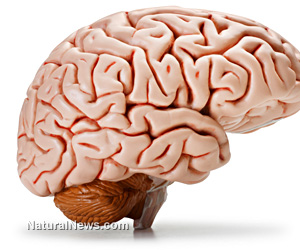
Go on a fast to improve brain health and live longer
Monday, March 10, 2014 by: Raw Michelle
Tags: intermittent fasting, brain health, longevity
- Newly released JFK files reveal Pentagon's role in creating Lyme disease and covid in the same lab
- Ginseng's hidden anti-aging power: How compound K is rewriting the rules of skincare
- “Endgame: The Hidden Agenda 21” unveils a world of conspiracy and control
- L.A.'s rebuilding nightmare: Only 4 permits issued after fire destroys 6,000 homes
- Dr. Suzanne Humphries makes bombshell appearance on Joe Rogan podcast, exposing vaccine industry deception back to POLIOMYELITIS
- Scientists demand FDA withdraw mRNA COVID vaccines amid contamination and gene therapy concerns
- Former Congresswoman exposes CCP's deep infiltration of California through universities, ports, and fentanyl
- “The shame of Minnesota”: Somali immigrants behind $250 million child nutrition fraud in largest COVID-era scam
- PROCESSED TABLE SALT in foods found to fuel depression
- Here are TEN all-natural ways to protect your garden without using harmful chemicals
- “Independent” anti-Russia outlet MEDUZA faces COLLAPSE as US funding dries up
- BPA: The hidden hormone disruptor sabotaging your health - and how to fight back
- Chewing gum's dirty secret: How your daily habit could be flooding your body with microplastics
- The hidden battle in your glass: How A1 and A2 milk could shape your health
- Discovery of vast underground city beneath Giza pyramids challenges human history
- Catastrophic 7.7 earthquake devastates Myanmar and Thailand; death toll could reach 100,000
- Black cumin seed oil emerges as a powerful ally against breast cancer and chronic inflammation
- CDC finally halts $11 billion COVID funding scam as health officials admit the ‘pandemic’ was a fraud
- Newly released JFK files reveal Pentagon's role in creating Lyme disease and covid in the same lab
- Analysis: The coming economic collapse, a mass uprising and Trump's three secret weapons to halt the growing revolt
- Festive flavors: The sweet history, nutritional profile and health benefits of pecan pie
- Elon Musk: Aliens could be here on Earth RIGHT NOW
- Trump reverses course on Gaza plan, says “nobody is expelling Palestinians”
- Big Pharma's $8 Billion bribery scheme exposed: how doctors are pushed to prescribe junk science, not heal
- Boys are back in town: Trump’s patriotic alpha crew takes the wheel while toxic females ride in the backseat
- Reclaim your health: How midlife exercise reverses years of inactivity
- A lack of integrity in Academia: Harvard professor found GUILTY of fraudulent research to promote CRT theory
- Survival 101: Effective EMF blocking techniques
- EPA advisor admits the agency is funneling billions to climate groups ahead of Trump’s return to White House
- Dr. Mike Yeadon releases 15-minute testimony - WATCH - about genocidal intent of COVID “vaccines”
- 5 Simple steps to boost your brainpower: How to strengthen executive function in a distracted world
- Florida takes a stand: DeSantis proposes permanent ban on mRNA vaccine mandates
- Sugarcane extract superior to cholesterol-lowering drugs?
- Mike Adams Sermon 66: God will DESTROY ISRAEL for its wickedness
- Pilots report mysterious lights 'moving at extreme speeds' across Oregon skies
- Space war brewing? Russia threatens to destroy Starlink satellites
- EPA advisor admits the agency is funneling billions to climate groups ahead of Trump’s return to White House
- California's social media censorship law struck down: A victory for free speech or a threat to online safety?
- The Health Ranger releases “Vaccine Zombie” song and music video, using AI-animated zombies for the music video
- Dr. Mike Yeadon releases 15-minute testimony - WATCH - about genocidal intent of COVID “vaccines”
- The pandemic as a tool for INDOCTRINATION: Understanding “The Indoctrinated Brain” by Dr. Michael Nehls
- Newly released JFK files reveal Pentagon's role in creating Lyme disease and covid in the same lab
- Florida takes a stand: DeSantis proposes permanent ban on mRNA vaccine mandates
- Mike Adams releases country western hit single: Goin’ Back in Time is Comin’ Home
- Mike Adams releases music poetry sensation: A Child of God
- “Why we influenced the 2020 elections”: Facebook files reveal the coordinated effort to bury the Hunter Biden laptop story
- Unpacking the Lies That We’ve Been Fed – new song and music video released by Mike Adams, the Health Ranger
- RFK Jr. clears key hurdle: Sen. Susan Collins backs controversial HHS nominee, signaling a new era for health policy
- Mike Adams releases new song and music video: Nothing More Disgusting Than a Globalist
- Michigan sheriff announces criminal investigation into 2020 election crimes, Dominion Voting Systems
- Israeli soldiers accused of even more torture and abuse in the West Bank
- Migrants are taking advantage of recent hurricanes to scam residents and loot their homes
- House Intelligence Committee calls for the ARREST and PROSECUTION of Dr. Anthony Fauci
- Rep. Nancy Mace introduces bill to ban biological males from female facilities on federal property
- Red Cross issues warning to stop blood plasma donations from vaccinated people
- Scientists confirm: GENIUS brain function can be spontaneously unleashed in humans without any apparent cause
- EPA advisor admits the agency is funneling billions to climate groups ahead of Trump’s return to White House
- HYSSOP: What research reveals about the health benefits of this ancient holy herb
- Two containers with completed ballots fall out of truck in Florida
- Fully vaccinated about to see “tsunami” of illness and death, warns virologist
- Global leaders unite to clamp down on “misinformation” with UN-backed Cascais Declaration
- BREAKING: 2025 NDAA authorizes mandatory military draft of WOMEN across America… as Pentagon pursues global NUCLEAR war with both Russia and China at the same time
- Michael Yon warns of a ZIONIST TAKEOVER in Trump’s second administration
- BOMBSHELL: DNA testing kits are a SCAM to develop ethnic-specific bioweapons
- Ozempic and Wegovy weight loss drugs are injectable LIZARD VENOM PEPTIDES that may unleash a devastating wave of organ failure… side effects align with symptoms of SNAKE BITES
- Israeli soldiers accused of even more torture and abuse in the West Bank
- These 13 countries just signed an agreement to engineer a global FAMINE by destroying food supply
- NASA admits that climate change occurs because of changes in Earth’s solar orbit, and NOT because of SUVs and fossil fuels
- RFK Jr. clears key hurdle: Sen. Susan Collins backs controversial HHS nominee, signaling a new era for health policy
- Sermon 30: How Jesus reveals Caesar’s FAKE CURRENCY and FALSE AUTHORITY
- Coriander seeds: Ancient medicine backed by modern science
- Arizona officials claim Maricopa County needs 10-13 days to tabulate results of the election
The study, lead by Johns Hopkins University's School of Medicine professor Mark Mattson, suggests that calorie reduction via intermittent bouts of fasting one or two days every week can help brains. A variety of high-fiber vegetables, unsweetened teas and plenty of water are example of foods a person could have during a fast.
Why fasting is good for us
He explains that cutting 500 calories every fasting day or two plays a role in improving long-term cognitive function. He also advises eating as much as we'd like post-fast. Such a cycle, he says, is key in making this process as effective as possible in order to reap healthy brain benefits. For example, it's believed that taking our brain out of constant food-seeking mode (think back even to hunter-gatherer survival times) changes the way our brain chemicals and muscles are used and therefore, reduces stress.Professor Mattson is not alone in this belief. In fact, as far back as 1934, researchers noticed that guinea pigs that were given calorie-restrictive diets not only had more impressive nutrient levels than guinea pigs that were not restricted, but also lived twice as long. Additional research in the following years by those intrigued with this notion has shown that occasional fasting with healthy foods may have neuro-protective benefits. In fact, it may help those suffering from Alzheimer's and Parkinson's; studies have shown intermittent fasting triggers something called Brain-Derived Neurotrophic Factor (BDNF) functions in the brain that fight off such disorders. A better memory, better cognitive function and learning are all a part of this.
Heck, there's even the "Calorie Restriction Society International," comprised of members who buck the conventional "what we're told to consume" wisdom by partaking in reduced-calorie dietary habits. Their web sitelists one of their goals as "To help people apply calorie restriction science to their lives."
Fasting has also been shown to reduce oxidative stress and mitochondrial dysfunction that takes places in the event brain trauma as occurred.
Furthermore, studies show fasting may also promote longevity as well as a help maintain a youthful appearance.
Perhaps health-guru Mark Sisson says it best: "The occasional fast is a nearly risk-free endeavor with proven benefits in other areas, [so] I'll continue to miss a few meals every now and then."
Sources for this article include:
http://www.naturalnews.com
http://www.marksdailyapple.com/fasting-brain-function/#axzz2v1NWTSAB
http://www.mensjournal.com
http://www.crsociety.org/
About the author:
Raw Michelle is a natural health blogger and researcher, sharing her passions with others, using the Internet as her medium. She discusses topics in a straight forward way in hopes to help people from all walks of life achieve optimal health and well-being. She has authored and published hundreds of articles on topics such as the raw food diet and green living in general. >>> Click here to see more by Michelle
Intermittent fasting at FETCH.news
Get independent news alerts on natural cures, food lab tests, cannabis medicine, science, robotics, drones, privacy and more.
Take Action: Support Natural News by linking to this article from your website
Permalink to this article:
Embed article link: (copy HTML code below):
Reprinting this article:
Non-commercial use OK, cite NaturalNews.com with clickable link.
Follow Natural News on Facebook, Twitter, Google Plus, and Pinterest
Science News & Studies
Medicine News and Information
Food News & Studies
Health News & Studies
Herbs News & Information
Pollution News & Studies
Cancer News & Studies
Climate News & Studies
Survival News & Information
Gear News & Information
News covering technology, stocks, hackers, and more



"Big Tech and mainstream media are constantly trying to silence the independent voices that dare to bring you the truth about toxic food ingredients, dangerous medications and the failed, fraudulent science of the profit-driven medical establishment.
Email is one of the best ways to make sure you stay informed, without the censorship of the tech giants (Google, Apple, Facebook, Twitter, YouTube, etc.). Stay informed and you'll even likely learn information that may help save your own life."
–The Health Ranger, Mike Adams













































